#can you tell I love science fiction?
Note
Thanks for answering my ask before. If you don't mind me asking (again), can I ask, what are your top 10 (or top 7) favorite media (can be books/ manga/ anime/movies/tv series)? Why do you love them? Sorry if you've answered this question before......
Hello again - thanks so much for all of these questions!
Hmmmm, I have so many favourite things across so many different forms of media that choosing a top 7/10 is super hard. I've gone with my gut of the first things I thought of that I love, but the list could easily be wayyyyyy longer. I'm sorry - I tried to keep this as short as I could...
In no particular order:
My Hero Academia (anime + manga)
MHA is the first anime that I think I ever really properly enjoyed. I watched it in 2021/2022, immediately fell in love with it, and proceeded to devour both the anime and almost all of the manga. I obviously adore all of the characters, but I also love the way that MHA portrays superpowers - both in terms of how they function (w/ there being unique limitations to them) as well as how it depicts/explores superhero society. I don't normally go in for superhero type media anymore, but the combination of all of the above (plus literally the sickest soundtrack from Yuki Hayashi) easily makes it one of my fave ever things
The Wayfarers series by Becky Chambers (books)
I could write an entire dissertation on why this is one of my favourite series of all time, and why Becky Chambers is one of my favourite authors. But the shorter answer is: literally everything about them. Chambers' writing is beautiful, her narratives are full of love, hope and community, and her characters are incredibly diverse and well written. My fave book from the series is Record of a Spaceborn Few.
Dragon Age series (video games)
I first came across Dragon Age at a fan convention back in 2016/2017 during a panel on queer media (I think). In addition to the panel discussing the general queer relationships/characters in the series, they specifically highlighted Dorian and Krem in DA: Inquisition. The following day I went out, purchased all the games, and then played them through from the first game. IThe games are super fun to play, the writing is *chefs kiss*, and I love the themes that the games explore. I love them so much I've even written an article and done a podcast episode about them!
Jurassic Park franchise (films, books, games)
Jurassic Park is one of the franchises that I was raised on (along with Star Wars) and I have been obsessed with it ever since. I've seen all the films (up to Jurassic World), read the books, own books about JP, played a bunch of the games, and even have a poster map of Isla Nublar on my wall. Dinosaurs are one of the big reasons I love them, but also I think the films have always been very interesting to me for how they give us a lens in which to think about animal rights + conservation in a science fictional setting (something else I have also done a paper on!)
Final Fantasy XV (video game)
I'll keep this one short and sweet: best boys on a roadtrip that will both make your heart full of joy but will ultimately leave you a sobbing mess on the floor
(Honestly I didn't play FFXV until the end of 2022 and I am still !!!!!!! over it)
Haikyuu!! (anime)
sksalkkljsa. I don't even know what to say about this. HQ is just the fucking best.
I Was a Teenage Exocolonist (video game)
I don't talk about it so much anymore, but Exocolonist is still one of my favourite games and it makes my heart feel so much whenever I think about it. I love the entire aesthetic of it. I love how impactful your choices feel and how many different routes you can go down. I love how inclusive the game is, not just in terms of gender, race and sexuality but also with polyamoury + family/community dynamics. The worldbuilding is beautiful, the soundtrack is *cries*. Just...it's such a wonderful game.
Manic (film)
There are a lot of films I could choose for this list, but if I can only choose one (bc space) then I think Manic is a good pick. It's the 2001 indie film with Joseph Gordon-Levitt, Zooey Deschanel, Don Cheadle, etc, and is set in an adolescent psychiatric ward. This film means a lot to me personally, I'll just leave it at that.
Xandri Corelel series (books)
I spoke a bit about why I love the series so much in response to your favourite characters question but to summarise: cool as fuck science fiction series where cool as fuck autistic bisexual polyam protagonist, Xandri, is the head of the xeno-liaisons team. It's got stellar worldbuilding, excellent characters, and explores lots of interesting issues. Also, my favourite book is Tone of Voice (2nd in the series) partly bc its got space whales in it.
Mass Effect (video games)
I think by now its pretty clear I love science fiction, so Mass Effect was always gonna be a big hit with me. I actually played Dragon Age first, and then a friend told me I had to play ME. The entire series is just sooooo good for very similar reasons to a lot of my other favourites: well-written, beloved characters, cool ass narrative/s, choice-based, fun FPS moments, cool worldbuilding, sick soundtrack!
#can you tell I love science fiction?#can you tell I LOVE STUFF#honestly I'm kind of not sorry about writing a mini essay bc I could talk about these things at much greater length#I could very easily have also picked a top 7/10 for each category#I love to talk about the things I loveeeeeeeeee#media is so good actually#science fiction#my hero academia#bnha#haikyuu#hq#the wayfarers series#becky chambers#jurassic park#final fantasy xv#dragon age#dragon age inquisition#i was a teenage exocolonist#manic#failure to communicate#tone of voice#xandri corelel#mass effect#favourites#asks
5 notes
·
View notes
Text
Kind of a Reddit AITA post but sometimes it is a little funny to fuck with people in ways that deliberately conform to a stereotype of what they must think of you. the other day I was talking to my friend and I randomly said that I wanted a pet chimpanzee. I'd dress it in person clothes (dungarees and hats) and I'd teach it to love science fiction. And this girl nearby was like "you know how dangerous those things are, right? Also how unethical it is to keep an ape as your pet for your own amusement" and I was already seeing where the conversation was going so I was pretending ignorance like "yea but it wouldn't just be for my amusement. It would have practical points too." And she ignored that statement entirely to say "Well chimpanzees can rip faces off" and I was like. What's the most frustrating thing I can say now. Finally settled on "Mine wouldn't do that though." and you could tell she wanted to hurt me very very badly. Like a chimpanzee would if I had one as a pet
66K notes
·
View notes
Text
I finished my first ever watch of Star Trek: The Original Series last night and wow, what a journey.
I’ve loved all the Trek I’ve watched before, but for years I avoided TOS. I had watched a handful of episodes and not really been into it, and I didn’t want to deal with any sexism or racism or other remnants of the 60s. I bought into the Kirk Drift and thought he was an asshole, and I didn’t want to watch 79 episodes of an asshole.
But after finishing Lower Decks my husband and I decided to dive in and watch all of it. I expected to adore Spock and groan at the special effects. I expected to roll my eyes a lot.
Friends, I was so wrong. I am delighted by this series. There was plenty of things to roll my eyes at and cringe at and yeah there’s stuff that has aged poorly or maybe was bad from the start. But overall, what a joy to watch. It was so fun to see the origin of so many things in science fiction and Star Trek. The costumes and sets were fun to look at. The fighting scenes are sometimes goofy but fun to watch. So much of this show is FUN and you can tell they had a blast making it.
And yeah, I loved Spock. But Kirk, Kirk surprised me. He’s such a deeper and more interesting character than I realized before watching. He’s not really an asshole at all. He’s smart and sweet and a good leader. He loves and ship and his crew. As Spock would say, he’s fascinating.
I knew vaguely about K/S and the history of fanfiction but watching it it’s like…yeah. Of course. Of course these two are together. Of course they launched fandom as we know it. Of course people saw the way they looked at each other and knew they should be married.
If you haven’t watched it yet take this as your sign that you should give it a try. You probably don’t have to watch every episode. There are some real stinkers in there. But give it a try, go in with an open heart, and you might be as delighted by it as I am now.
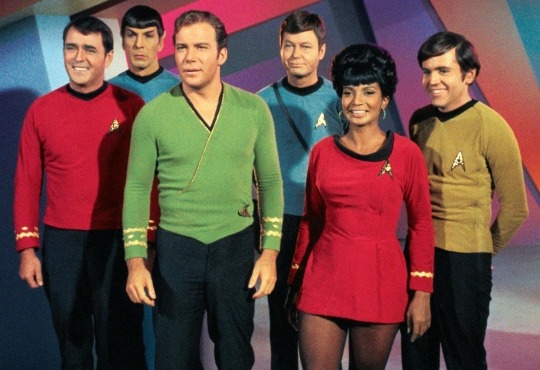
5K notes
·
View notes
Note
nellie the biologist and keiko oh i’m there with u…. now i have to read sourdough
sourdough is a very good book but i will warn you that lois is a much more likable and mentally stable character than nellie, the biologist, and keiko! still i cannot recommend the book enough, let me know what you think when you read it!
#<3#the book is all about food culture & where it intersects with community identity history myth art technology etc#it also launched my sourdough baking phase in high school (pre-covid btw i was ahead of the curve on that one)#& my fascination with the science behind fermentation & microbiomes#idk if anyone remembers what i said about the movie the menu but i thought the commentary on modern food culture#was out of touch & contrived - this is the exact opposite imo#it's very in touch with innovation within the world of culinary arts & directly alludes to historical movements within that field#as well as other significant movements in food history/innovation while being a forward thinking piece of speculative fiction#about the future of food technology !#it's an apt & grounded commentary that balances the possibilities of the future with the importance of the past#& necessary caution about the human ego when it comes to interfering with natural processes etc#but on a character level i think it's a very joyful optimistic exploratory book! & i love that about lois#anyway i've probably read it at least 8 times lol & i think it's time for a reread#it's a perfect summer book to me#something about robin sloan is that you can tell he had fun writing his books & that makes them fun to read
1 note
·
View note
Text
had been thinking about seeing the new Ant-Man when it came out, ya know, on one of the discount days bc movie tickets are pricey these days. I mean, it looked right up my alley; alternate dimensions, timeline fuckery, cool visuals, Jonathan Majors ripped as hell. Buuuuut I saw some spoilers, some shitty cellphone footage, read some reviews, ended up caving and reading the plot online… so anyway, I decided to spend that money on a jug of soy sauce and bag of jalapeños, and I think that’s a fair alternative.
#I go through a buttload of soy sauce and jalapeños#they just go with everything!#also no Marvel hate at me on this post#just let me enjoy my visual junk food#is it so bad to want to see Paul Rudd towering before me on a giant screen???#anyway… yeah… it looked really interesting to me. much more so than any of the recent Marvel movies.#I love science fiction with alternate dimensions and time stuff#buuuut… I guess I couldn’t really expect Marvel to actually do anything too exciting with those concepts#but hey! it might actually be good when I finally see it!#I just don’t have much of a disposable income and I think I’d rather spend that cash on foodstuff I know I’ll enjoy#and I’d rather not spend money on going out if I’m this ambivilant on it#critic’s reviews are mid. viewer reviews are completely unreliable to me#marvel fans will either give super positive reviews just bc it’s marvel#or they’ll tank their reviews for the dumbest reasons. like saying it’s too woke bc black Kang#fickle as cats and just as reliable#ALSO I saw tweets saying stuff like ‘oh it’s the beginning of a new phase so it’s a little rough and not that great but give them a break!#my buddy my friend they have churned out so many of these films by now#’new phase’ means nothing! they should know how to tell a good story!#and why can’t the start of a new story arc be good? you can have a good story that sets things up for the future#you butts. you fools.#I was honestly so hyped to see Kang fuck shit up 😕#and I actually really like the Ant-Man movies#I just haven’t really been into any of the Marvel movies after Endgame#okay but again… I haven’t seen it. just read the plot and some reviews.#don’t listen to me. I’m just ranting.#I wanted something really weird and cool with characters dying or whatever I dunno… I’m grumpy about it#but I made some fried rice. it’s good. I got some jalapeño in my eye. that’s not so good.#I hope no one actually wasted their time reading through these tags. I’m sorry if you did#you can ignore this#text
0 notes
Text
What No One Tells You About Writing Fantasy
Every author has their preferred genres. I love fantasy and sci-fi, but began with historical fiction. I hated all the research that historical fiction demands and thought, if I build my own world, no research required.
Boy, was I wrong.
So to anyone dipping their toe into fantasy/sci-fi, here’s seven things I wish I knew about the genres before I committed to writing for them.
1. You still have to research. Everything.
If you want any of your fantasy battle sequences, or your space ships, or your droids and robots, or your fictional government and fictional politics to read at all believable.
In sci-fi, you research astronomy, robotics, politics, political science, history, engineering, anthropology. In fantasy, you have to research historical battle tactics, geography, real-world mythology, folklore, and fairytales, and much of it overlaps with science fiction.
I say you *have to* assuming you want your work to be original and unique and stand out from the crowd. Fanfic writers put in the research for a 30k word smut fic, you can and will have to research for your original work.
2. Naming everything gets exhausting
I hate coming up with new names, especially when I write worlds and places divorced from Earthly customs and can’t rely on Earthly naming conventions. You have to name all your characters, all your towns, villages, cities, realms, kingdoms, planets, galaxies, star systems.
You have to name your rebel faction, your imperial government, significant battles. Your spaceships, your fantasy companies and organizations, your magic system, made-up MacGuffins, androids, computer programs. The list goes on and on and on.
And you have to do it all without it sounding and reading ridiculous and unpronounceable, or racist. Your fantasy realms have to have believable naming patterns. It. Gets. Exhausting.
3. It will never read like you’re watching a movie
Do you know how fast movies can cut between scenes? Movies can balance five plotlines at once all converging with rapid edits, without losing their audience. Sometimes single lines of dialogue, or single wordless shots are all a scene gets before it cuts. If you try to replicate that by head-hopping around, you will make a mess.
It’s perfectly fine to write like you’re watching a movie, but you can’t rely on visual tricks to get your point across when all you have is text on a page – like slow mo, lens flares, epically lit cinematic shots, or the aforementioned rapid edits.
It doesn’t have to, nor should it, look like a movie. Books existed long before film, so don’t let yourself get caught up in how ~cinematic~ it may or may not look.
4. Your space opera will be compared to Star Wars and Star Trek
And your fairy epic will be compared to Tinkerbell, your vampires to Twilight, your zombies to The Walking Dead, Shaun of the Dead, World War Z. Your wizards and witches and any whisper of a fantasy school for fantasy children will be compared to Harry Potter. Your high fantasy adventure will be compared to Lord of the Rings.
You can’t avoid it, but you can avoid doing it to yourself. When people ask about your book, let them say “oh, you mean like Star Wars” to which you then can say, kind of, except XYZ happens in my book. These IPs will never fade from the public consciousness, not while you exist to read this post, at least, but Harry Potter isn’t the only urban fantasy out there. Lord of the Rings isn’t the only high fantasy. Star Wars isn’t the only space opera.
Yours will be on the shelves right next to them, soon enough, and who knows? You might dethrone them.
5. Your world-building is an iceberg, and your book is the tip
I don’t pay for any of those programs that help you organize your book and mythos. I write exclusively on Apple Notes, MS Word, and Google Suite (and all are free to me). I have folders on Apple Notes with more words inside them than the books they’re written for.
If you try to cram an entire college textbook’s worth of content into your novel, you will have left zero room for actual story. The same goes for all the research you did, all the hours slaving away for just a few details and strings of dialogue.
There’s a balance, no matter how dense your story is. If you really want to include all those extra details, slap some appendices at the end. Commission some maps.
6. The gatekeeping for fantasy and sci-fi is still very real
Pen names and pseudonyms exist for a reason. A female author writing fantasy that isn’t just a backdrop for romance? You have a harder battle ahead of you than your male counterparts, at least in the US. And even then, your female protagonist will be scrutinized and torn apart.
She’ll either be too girly or not girly enough, too sexy, or not sexy enough. She’ll be called a Mary Sue, a radical feminist mouthpiece, some woke propaganda. Every action she takes will be criticized as unrealistic and if she has fans who are girls, they will be mocked, too.
If you have queer characters, characters of color, they won’t be good enough, they won’t please everyone, and someone will still call you a bigot. A lot of someones will still call you a bigot.
Do your due diligence and hire your army of sensitivity readers and listen to them, but you cannot please everyone, so might as well write to please yourself. You’re the one who will have to read it a thousand times until it’s published.
7. Your “original” idea has been done before, and that’s okay
Stories have been told since before language evolved. The sum of the parts of your novel may be original, but even then, it’s colored by the media you’ve consumed. And that’s okay!
How many Cinderella stories are there? How many high fantasies? How many books about werewolves and witches and vampires? Gods and goddesses and celestial beings? Fairies and dragons and trolls? Aliens, robots, alien robots? Romeo and Juliette? Superheroes and mutants?
Zombies may be the avenue through which you tell your story, but it’s not *just* about zombies, is it? It’s about the characters who battle them, the endurance of the human spirit, or the end of an era, the death of a nation. So don’t get discouraged, everyone before you and everyone after will have written someone on the backs of what came before and it still feels new.
#writing advice#writing resources#writing tips#writing tools#writing a book#fantasy#scifi#writeblr#what no one tells you about writing
1K notes
·
View notes
Text
I’m writing fanfic about the carbon cycle again
#specifically the bajoran one#can you tell I love my field of study so much?#xenobiogeochemistry is so fun I get to just make shit up and then backtrack to all the how and why and what effects it has on other systems#like i just decided bajor would have low co2 levels because why not#so now it also has lower volcanic activity than earth and a higher proportion of photosynthetic lifeforms#where to all those photosynthesizers live? in the oceans which i have decided are more shallow than those on earth#this has the interesting side effect that bajorans would be used to breathing lower co2 levels and be more prone to co2 poisoning than human#i'm sure i can work that into something somewhere because it's intersting and i want to#i'm also currently having the internal debate of 'how much does the average person know about carbon cycling?'#do most people know the rock cycle exists? that it's part of the carbon cycle? that it's not limited to coal but also carbonate rocks?#hylian writes fanfic#a day in the life of a fanfic author#hylian does (fictional) science
0 notes
Text
The whole of Star Trek canon makes way more sense of you give it the Xena: Warrior Princess treatment. Within XWP, it is canon that the whole story is being given to us through bits and pieces of Gabrielle's scrolls. So any weirdness can be explained away as this bit was missing, so we filled it in. Or how was Xena at the Trojan War, but also around during Julius Caesar's reign? Gabrielle was trying her hand at fiction (without the cursed scroll this time) and wanted to write a "what if we were in Troy" story.
How does this compare to Star Trek? I hear some of you asking. Well, Star Trek episodes frequently begin with a log entry. The Captain or Chief Engineer or Science Officer or whoever is telling the story. We are watching the events play out as they recount them. And since every crew member is supposed to keep logs, if we piece those logs together, we presumably have a coherent story. But listen to any group of people recount a story and you'll hear the inconsistencies, the bias, the limited perspective. Now couple that with the fact that these stories are being turned into a show at some future date when bits and pieces of the story may be lost and you have a recipe for weirdness.
For me, thinking of it this way explains so many things. Why were there so many encounters with historical and mythological figures on Kirks Enterprise? Well, Janeway said it herself: there's debate about whether or not Kirk was exaggerating his logs. Why does it seem like there's weird one-sided sexual tension between two characters? Because character A is keeping their logs in a way that doesn't hide their unrequited love and longing for the very oblivious character B. Why is this or that character seemingly missing from an event that they'd have a vested interest in? Their log was lost or corrupted or they were so excited to be a part of the mission that they completely forgot to write it down.
I don't know if I'm making any sense. But it makes sense for me and is much more fun to think of Star Trek this way than it is to be overly critical of canon inconsistencies within a franchise that has been around for as long as it has and gone through as many permutations as it has.
#star trek#star trek tos#tos#star trek tng#tng#star trek voyager#voy#ds9#star trek ds9#enterprise#star trek enterprise#discovery#star trek discovery#star trek lower decks#lower decks#strange new worlds#star trek strange new worlds#star trek picard#picard#star trek lore
2K notes
·
View notes
Text

@moscca you're right and you should say it! Here's a really great compilation of Taz quotes I've been keeping in mind
From an interview where she says that Lovecraft was one of her main inspirations, talks about her relationship with horror vs. sff as a genre author, and wanting to find relatable heroines in horror lit.
I didn’t write Gideon the Ninth for the characters—I wrote it entirely for the structure. I wanted to tell a very specific story, and I needed everything to serve that story.
I want people to realise there are no boundaries. I also want to release people from having to take their universe entirely seriously, if they don’t want to. Science fiction and fantasy reflects ourselves, our anxieties, our joys. I’m just writing to amuse myself, as per usual.
I am writing for my younger self and it would be disgusting of me to try to teach her anything.
(& other quotes from that same interview)
Although love and forgiveness aren’t necessarily the same thing either, Gideon’s frankly divine ability to forgive is a huge core of the novel. [...] Forgiveness is almost the electrical current being able to transmit through love.
The way I personally stay true to the story I started down on is to give myself permission to not teach anyone anything. [...] I know that a lot of people do take enormous pleasure and relief in lines or phrases or ideas from stories that ring true to their own lives, but it’s important for me that I tell a story and that I’m not writing Chicken Soup for the Necromantic Soul.
...the God of the Locked Tomb IS a man; he IS the Father and the Teacher; it’s an inherently masc role played by someone who has an uneasy relationship himself to playing a Biblical patriarch. John falls back on hierarchies and roles because they’re familiar even when he’s struggling not to. But the divine in the Locked Tomb is essentially feminine on multiple axes.
It seems to me that most books by anyone female-adjacent have an expectation that they will comfort the uncomfortable and discomfit the comfortable etc., whereas a guy can just tell an adventure story and be done with it. This ties in with an idea that I think nowadays that good art is moral and bad art is immoral: i.e. if a story is good it must somehow be beautiful on the moral scale. We go looking for why the art we love is moral even if the art we love is a donut.
#gathering quotes for the ask in my inbox lol#tamsyn muir#tlt thoughts#on writing#i want to get drunk with her so bad. what a mind#elle tlt posting
514 notes
·
View notes
Text
Writing advice for new writers
Some things that I wished I had been told when I started writing <3
1. Read, read, read:
Immerse yourself in the works of established authors across various genres. Reading not only exposes you to different writing styles and techniques but also helps you understand the fundamentals of storytelling. It broadens your vocabulary, sparks your imagination, and inspires your own writing.
2. Write regularly:
Make writing a habit. Set aside dedicated time each day or week to write, even if it's just for a short period. Consistency is key to improving your skills and developing your unique voice. Practice, experiment, and don't be afraid to make mistakes – it's all part of the learning process.
3. Embrace the editing process:
Writing is rewriting. Understand that your first draft is just the beginning. Editing and revising are crucial steps that transform your work into its best version. Be open to constructive feedback, whether from friends, writing groups, or professionals. Embrace the opportunity to refine your ideas, strengthen your prose, and polish your storytelling.
4. Find your writing environment:
Discover the environment in which you feel most comfortable and creative. Experiment with different settings, and create a space that inspires and motivates you to write. Surround yourself with objects, images, or music that enhance your creativity.
5. Explore different genres and styles:
Don't limit yourself to a single genre or writing style. Experiment with different forms of writing – from short stories to poetry, fiction to non-fiction. Trying new genres and styles challenges you as a writer, expands your skills. I also find this really helpful If I feel stuck in a project. Whenever I feel really stuck, I like to open a new document, or even get a pen and some paper and just write something completely different. It might just be a silly little poem, or maybe I’ll just write down what I’ve been doing that day. Just something to get out of my head, and then I can get back to my project with a clearer mind.
6. Write what you love:
Write about topics that genuinely interest and excite you. When you're passionate about your subject matter, your enthusiasm will shine through in your writing. Whether it's fantasy, romance, history, or science fiction, let your love for the topic fuel your creativity and captivate your readers.
7. Trust your voice:
Each writer has a unique voice, perspective, and story to tell. Embrace your individuality and trust your instincts. Don't compare yourself to others or try to imitate someone else's style. Your voice is what sets you apart and makes your writing authentic.
8. Enjoy the process:
Above all, enjoy the process of writing. Writing is a creative outlet, a form of self-expression, and a journey of self-discovery. Embrace the ups and downs, the challenges and triumphs, and savor the joy of bringing your ideas to life through words.
And most importantly of all: Remember, every writer starts somewhere, and like any other craft, it takes time, practice and dedication. Happy writing y’all! <3
#jane’s writing advice#writerscommunity#writing#writers on tumblr#writing advice#writing tips#authors of tumblr#writer things#writeblr#new writers on tumblr#writblr#writers and poets#light academia#dark academia#bookish#books#fanfiction#poetry#fiction#young writer#young writers#young author#writer#writers
800 notes
·
View notes
Text
The disenshittified internet starts with loyal "user agents"
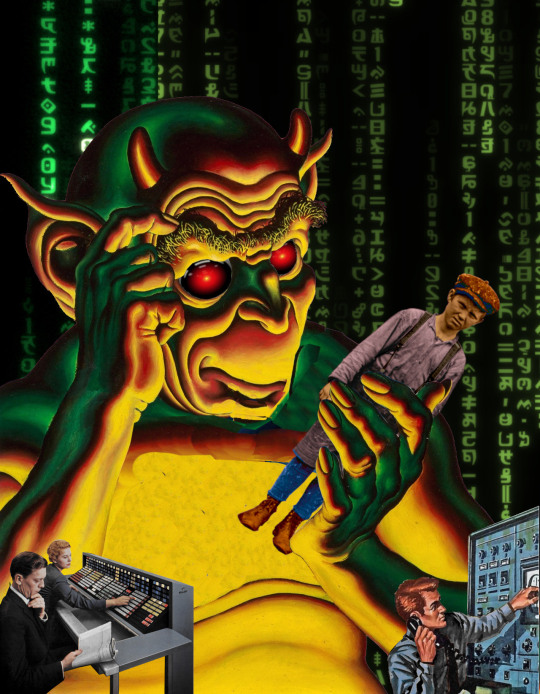
I'm in TARTU, ESTONIA! Overcoming the Enshittocene (TOMORROW, May 8, 6PM, Prima Vista Literary Festival keynote, University of Tartu Library, Struwe 1). AI, copyright and creative workers' labor rights (May 10, 8AM: Science Fiction Research Association talk, Institute of Foreign Languages and Cultures building, Lossi 3, lobby). A talk for hackers on seizing the means of computation (May 10, 3PM, University of Tartu Delta Centre, Narva 18, room 1037).

There's one overwhelmingly common mistake that people make about enshittification: assuming that the contagion is the result of the Great Forces of History, or that it is the inevitable end-point of any kind of for-profit online world.
In other words, they class enshittification as an ideological phenomenon, rather than as a material phenomenon. Corporate leaders have always felt the impulse to enshittify their offerings, shifting value from end users, business customers and their own workers to their shareholders. The decades of largely enshittification-free online services were not the product of corporate leaders with better ideas or purer hearts. Those years were the result of constraints on the mediocre sociopaths who would trade our wellbeing and happiness for their own, constraints that forced them to act better than they do today, even if the were not any better:
https://pluralistic.net/2024/04/24/naming-names/#prabhakar-raghavan
Corporate leaders' moments of good leadership didn't come from morals, they came from fear. Fear that a competitor would take away a disgruntled customer or worker. Fear that a regulator would punish the company so severely that all gains from cheating would be wiped out. Fear that a rival technology – alternative clients, tracker blockers, third-party mods and plugins – would emerge that permanently severed the company's relationship with their customers. Fears that key workers in their impossible-to-replace workforce would leave for a job somewhere else rather than participate in the enshittification of the services they worked so hard to build:
https://pluralistic.net/2024/04/22/kargo-kult-kaptialism/#dont-buy-it
When those constraints melted away – thanks to decades of official tolerance for monopolies, which led to regulatory capture and victory over the tech workforce – the same mediocre sociopaths found themselves able to pursue their most enshittificatory impulses without fear.
The effects of this are all around us. In This Is Your Phone On Feminism, the great Maria Farrell describes how audiences at her lectures profess both love for their smartphones and mistrust for them. Farrell says, "We love our phones, but we do not trust them. And love without trust is the definition of an abusive relationship":
https://conversationalist.org/2019/09/13/feminism-explains-our-toxic-relationships-with-our-smartphones/
I (re)discovered this Farrell quote in a paper by Robin Berjon, who recently co-authored a magnificent paper with Farrell entitled "We Need to Rewild the Internet":
https://www.noemamag.com/we-need-to-rewild-the-internet/
The new Berjon paper is narrower in scope, but still packed with material examples of the way the internet goes wrong and how it can be put right. It's called "The Fiduciary Duties of User Agents":
https://papers.ssrn.com/sol3/papers.cfm?abstract_id=3827421
In "Fiduciary Duties," Berjon focuses on the technical term "user agent," which is how web browsers are described in formal standards documents. This notion of a "user agent" is a holdover from a more civilized age, when technologists tried to figure out how to build a new digital space where technology served users.
A web browser that's a "user agent" is a comforting thought. An agent's job is to serve you and your interests. When you tell it to fetch a web-page, your agent should figure out how to get that page, make sense of the code that's embedded in, and render the page in a way that represents its best guess of how you'd like the page seen.
For example, the user agent might judge that you'd like it to block ads. More than half of all web users have installed ad-blockers, constituting the largest consumer boycott in human history:
https://doc.searls.com/2023/11/11/how-is-the-worlds-biggest-boycott-doing/
Your user agent might judge that the colors on the page are outside your visual range. Maybe you're colorblind, in which case, the user agent could shift the gamut of the colors away from the colors chosen by the page's creator and into a set that suits you better:
https://dankaminsky.com/dankam/
Or maybe you (like me) have a low-vision disability that makes low-contrast type difficult to impossible to read, and maybe the page's creator is a thoughtless dolt who's chosen light grey-on-white type, or maybe they've fallen prey to the absurd urban legend that not-quite-black type is somehow more legible than actual black type:
https://uxplanet.org/basicdesign-never-use-pure-black-in-typography-36138a3327a6
The user agent is loyal to you. Even when you want something the page's creator didn't consider – even when you want something the page's creator violently objects to – your user agent acts on your behalf and delivers your desires, as best as it can.
Now – as Berjon points out – you might not know exactly what you want. Like, you know that you want the privacy guarantees of TLS (the difference between "http" and "https") but not really understand the internal cryptographic mysteries involved. Your user agent might detect evidence of shenanigans indicating that your session isn't secure, and choose not to show you the web-page you requested.
This is only superficially paradoxical. Yes, you asked your browser for a web-page. Yes, the browser defied your request and declined to show you that page. But you also asked your browser to protect you from security defects, and your browser made a judgment call and decided that security trumped delivery of the page. No paradox needed.
But of course, the person who designed your user agent/browser can't anticipate all the ways this contradiction might arise. Like, maybe you're trying to access your own website, and you know that the security problem the browser has detected is the result of your own forgetful failure to renew your site's cryptographic certificate. At that point, you can tell your browser, "Thanks for having my back, pal, but actually this time it's fine. Stand down and show me that webpage."
That's your user agent serving you, too.
User agents can be well-designed or they can be poorly made. The fact that a user agent is designed to act in accord with your desires doesn't mean that it always will. A software agent, like a human agent, is not infallible.
However – and this is the key – if a user agent thwarts your desire due to a fault, that is fundamentally different from a user agent that thwarts your desires because it is designed to serve the interests of someone else, even when that is detrimental to your own interests.
A "faithless" user agent is utterly different from a "clumsy" user agent, and faithless user agents have become the norm. Indeed, as crude early internet clients progressed in sophistication, they grew increasingly treacherous. Most non-browser tools are designed for treachery.
A smart speaker or voice assistant routes all your requests through its manufacturer's servers and uses this to build a nonconsensual surveillance dossier on you. Smart speakers and voice assistants even secretly record your speech and route it to the manufacturer's subcontractors, whether or not you're explicitly interacting with them:
https://www.sciencealert.com/creepy-new-amazon-patent-would-mean-alexa-records-everything-you-say-from-now-on
By design, apps and in-app browsers seek to thwart your preferences regarding surveillance and tracking. An app will even try to figure out if you're using a VPN to obscure your location from its maker, and snitch you out with its guess about your true location.
Mobile phones assign persistent tracking IDs to their owners and transmit them without permission (to its credit, Apple recently switch to an opt-in system for transmitting these IDs) (but to its detriment, Apple offers no opt-out from its own tracking, and actively lies about the very existence of this tracking):
https://pluralistic.net/2022/11/14/luxury-surveillance/#liar-liar
An Android device running Chrome and sitting inert, with no user interaction, transmits location data to Google every five minutes. This is the "resting heartbeat" of surveillance for an Android device. Ask that device to do any work for you and its pulse quickens, until it is emitting a nearly continuous stream of information about your activities to Google:
https://digitalcontentnext.org/blog/2018/08/21/google-data-collection-research/
These faithless user agents both reflect and enable enshittification. The locked-down nature of the hardware and operating systems for Android and Ios devices means that manufacturers – and their business partners – have an arsenal of legal weapons they can use to block anyone who gives you a tool to modify the device's behavior. These weapons are generically referred to as "IP rights" which are, broadly speaking, the right to control the conduct of a company's critics, customers and competitors:
https://locusmag.com/2020/09/cory-doctorow-ip/
A canny tech company can design their products so that any modification that puts the user's interests above its shareholders is illegal, a violation of its copyright, patent, trademark, trade secrets, contracts, terms of service, nondisclosure, noncompete, most favored nation, or anticircumvention rights. Wrap your product in the right mix of IP, and its faithless betrayals acquire the force of law.
This is – in Jay Freeman's memorable phrase – "felony contempt of business model." While more than half of all web users have installed an ad-blocker, thus overriding the manufacturer's defaults to make their browser a more loyal agent, no app users have modified their apps with ad-blockers.
The first step of making such a blocker, reverse-engineering the app, creates criminal liability under Section 1201 of the Digital Millennium Copyright Act, with a maximum penalty of five years in prison and a $500,000 fine. An app is just a web-page skinned in sufficient IP to make it a felony to add an ad-blocker to it (no wonder every company wants to coerce you into using its app, rather than its website).
If you know that increasing the invasiveness of the ads on your web-page could trigger mass installations of ad-blockers by your users, it becomes irrational and self-defeating to ramp up your ads' invasiveness. The possibility of interoperability acts as a constraint on tech bosses' impulse to enshittify their products.
The shift to platforms dominated by treacherous user agents – apps, mobile ecosystems, walled gardens – weakens or removes that constraint. As your ability to discipline your agent so that it serves you wanes, the temptation to turn your user agent against you grows, and enshittification follows.
This has been tacitly understood by technologists since the web's earliest days and has been reaffirmed even as enshittification increased. Berjon quotes extensively from "The Internet Is For End-Users," AKA Internet Architecture Board RFC 8890:
Defining the user agent role in standards also creates a virtuous cycle; it allows multiple implementations, allowing end users to switch between them with relatively low costs (…). This creates an incentive for implementers to consider the users' needs carefully, which are often reflected into the defining standards. The resulting ecosystem has many remaining problems, but a distinguished user agent role provides an opportunity to improve it.
And the W3C's Technical Architecture Group echoes these sentiments in "Web Platform Design Principles," which articulates a "Priority of Constituencies" that is supposed to be central to the W3C's mission:
User needs come before the needs of web page authors, which come before the needs of user agent implementors, which come before the needs of specification writers, which come before theoretical purity.
https://w3ctag.github.io/design-principles/
But the W3C's commitment to faithful agents is contingent on its own members' commitment to these principles. In 2017, the W3C finalized "EME," a standard for blocking mods that interact with streaming videos. Nominally aimed at preventing copyright infringement, EME also prevents users from choosing to add accessibility add-ons that beyond the ones the streaming service permits. These services may support closed captioning and additional narration of visual elements, but they block tools that adapt video for color-blind users or prevent strobe effects that trigger seizures in users with photosensitive epilepsy.
The fight over EME was the most contentious struggle in the W3C's history, in which the organization's leadership had to decide whether to honor the "priority of constituencies" and make a standard that allowed users to override manufacturers, or whether to facilitate the creation of faithless agents specifically designed to thwart users' desires on behalf of manufacturers:
https://www.eff.org/deeplinks/2017/09/open-letter-w3c-director-ceo-team-and-membership
This fight was settled in favor of a handful of extremely large and powerful companies, over the objections of a broad collection of smaller firms, nonprofits representing users, academics and other parties agitating for a web built on faithful agents. This coincided with the W3C's operating budget becoming entirely dependent on the very large sums its largest corporate members paid.
W3C membership is on a sliding scale, based on a member's size. Nominally, the W3C is a one-member, one-vote organization, but when a highly concentrated collection of very high-value members flex their muscles, W3C leadership seemingly perceived an existential risk to the organization, and opted to sacrifice the faithfulness of user agents in service to the anti-user priorities of its largest members.
For W3C's largest corporate members, the fight was absolutely worth it. The W3C's EME standard transformed the web, making it impossible to ship a fully featured web-browser without securing permission – and a paid license – from one of the cartel of companies that dominate the internet. In effect, Big Tech used the W3C to secure the right to decide who would compete with them in future, and how:
https://blog.samuelmaddock.com/posts/the-end-of-indie-web-browsers/
Enshittification arises when the everyday mediocre sociopaths who run tech companies are freed from the constraints that act against them. When the web – and its browsers – were a big, contented, diverse, competitive space, it was harder for tech companies to collude to capture standards bodies like the W3C to secure even more dominance. As the web turned into Tom Eastman's "five giant websites filled with screenshots of text from the other four," that kind of collusion became much easier:
https://pluralistic.net/2023/04/18/cursed-are-the-sausagemakers/#how-the-parties-get-to-yes
In arguing for faithful agents, Berjon associates himself with the group of scholars, regulators and activists who call for user agents to serve as "information fiduciaries." Mostly, information fiduciaries come up in the context of user privacy, with the idea that entities that hold a user's data would have the obligation to put the user's interests ahead of their own. Think of a lawyer's fiduciary duty in respect of their clients, to give advice that reflects the client's best interests, even when that conflicts with the lawyer's own self-interest. For example, a lawyer who believes that settling a case is the best course of action for a client is required to tell them so, even if keeping the case going would generate more billings for the lawyer and their firm.
For a user agent to be faithful, it must be your fiduciary. It must put your interests ahead of the interests of the entity that made it or operates it. Browsers, email clients, and other internet software that served as a fiduciary would do things like automatically blocking tracking (which most email clients don't do, especially webmail clients made by companies like Google, who also sell advertising and tracking).
Berjon contemplates a legally mandated fiduciary duty, citing Lindsey Barrett's "Confiding in Con Men":
https://papers.ssrn.com/sol3/papers.cfm?abstract_id=3354129
He describes a fiduciary duty as a remedy for the enforcement failures of EU's GDPR, a solidly written, and dismally enforced, privacy law. A legally backstopped duty for agents to be fiduciaries would also help us distinguish good and bad forms of "innovation" – innovation in ways of thwarting a user's will are always bad.
Now, the tech giants insist that they are already fiduciaries, and that when they thwart a user's request, that's more like blocking access to a page where the encryption has been compromised than like HAL9000's "I can't let you do that, Dave." For example, when Louis Barclay created "Unfollow Everything," he (and his enthusiastic users) found that automating the process of unfollowing every account on Facebook made their use of the service significantly better:
https://slate.com/technology/2021/10/facebook-unfollow-everything-cease-desist.html
When Facebook shut the service down with blood-curdling legal threats, they insisted that they were simply protecting users from themselves. Sure, this browser automation tool – which just automatically clicked links on Facebook's own settings pages – seemed to do what the users wanted. But what if the user interface changed? What if so many users added this feature to Facebook without Facebook's permission that they overwhelmed Facebook's (presumably tiny and fragile) servers and crashed the system?
These arguments have lately resurfaced with Ethan Zuckerman and Knight First Amendment Institute's lawsuit to clarify that "Unfollow Everything 2.0" is legal and doesn't violate any of those "felony contempt of business model" laws:
https://pluralistic.net/2024/05/02/kaiju-v-kaiju/
Sure, Zuckerman seems like a good guy, but what if he makes a mistake and his automation tool does something you don't want? You, the Facebook user, are also a nice guy, but let's face it, you're also a naive dolt and you can't be trusted to make decisions for yourself. Those decisions can only be made by Facebook, whom we can rely upon to exercise its authority wisely.
Other versions of this argument surfaced in the debate over the EU's decision to mandate interoperability for end-to-end encrypted (E2EE) messaging through the Digital Markets Act (DMA), which would let you switch from, say, Whatsapp to Signal and still send messages to your Whatsapp contacts.
There are some good arguments that this could go horribly awry. If it is rushed, or internally sabotaged by the EU's state security services who loathe the privacy that comes from encrypted messaging, it could expose billions of people to serious risks.
But that's not the only argument that DMA opponents made: they also argued that even if interoperable messaging worked perfectly and had no security breaches, it would still be bad for users, because this would make it impossible for tech giants like Meta, Google and Apple to spy on message traffic (if not its content) and identify likely coordinated harassment campaigns. This is literally the identical argument the NSA made in support of its "metadata" mass-surveillance program: "Reading your messages might violate your privacy, but watching your messages doesn't."
This is obvious nonsense, so its proponents need an equally obviously intellectually dishonest way to defend it. When called on the absurdity of "protecting" users by spying on them against their will, they simply shake their heads and say, "You just can't understand the burdens of running a service with hundreds of millions or billions of users, and if I even tried to explain these issues to you, I would divulge secrets that I'm legally and ethically bound to keep. And even if I could tell you, you wouldn't understand, because anyone who doesn't work for a Big Tech company is a naive dolt who can't be trusted to understand how the world works (much like our users)."
Not coincidentally, this is also literally the same argument the NSA makes in support of mass surveillance, and there's a very useful name for it: scalesplaining.
Now, it's totally true that every one of us is capable of lapses in judgment that put us, and the people connected to us, at risk (my own parents gave their genome to the pseudoscience genetic surveillance company 23andme, which means they have my genome, too). A true information fiduciary shouldn't automatically deliver everything the user asks for. When the agent perceives that the user is about to put themselves in harm's way, it should throw up a roadblock and explain the risks to the user.
But the system should also let the user override it.
This is a contentious statement in information security circles. Users can be "socially engineered" (tricked), and even the most sophisticated users are vulnerable to this:
https://pluralistic.net/2024/02/05/cyber-dunning-kruger/#swiss-cheese-security
The only way to be certain a user won't be tricked into taking a course of action is to forbid that course of action under any circumstances. If there is any means by which a user can flip the "are you very sure?" circuit-breaker back on, then the user can be tricked into using that means.
This is absolutely true. As you read these words, all over the world, vulnerable people are being tricked into speaking the very specific set of directives that cause a suspicious bank-teller to authorize a transfer or cash withdrawal that will result in their life's savings being stolen by a scammer:
https://www.thecut.com/article/amazon-scam-call-ftc-arrest-warrants.html
We keep making it harder for bank customers to make large transfers, but so long as it is possible to make such a transfer, the scammers have the means, motive and opportunity to discover how the process works, and they will go on to trick their victims into invoking that process.
Beyond a certain point, making it harder for bank depositors to harm themselves creates a world in which people who aren't being scammed find it nearly impossible to draw out a lot of cash for an emergency and where scam artists know exactly how to manage the trick. After all, non-scammers only rarely experience emergencies and thus have no opportunity to become practiced in navigating all the anti-fraud checks, while the fraudster gets to run through them several times per day, until they know them even better than the bank staff do.
This is broadly true of any system intended to control users at scale – beyond a certain point, additional security measures are trivially surmounted hurdles for dedicated bad actors and as nearly insurmountable hurdles for their victims:
https://pluralistic.net/2022/08/07/como-is-infosec/
At this point, we've had a couple of decades' worth of experience with technological "walled gardens" in which corporate executives get to override their users' decisions about how the system should work, even when that means reaching into the users' own computer and compelling it to thwart the user's desire. The record is inarguable: while companies often use those walls to lock bad guys out of the system, they also use the walls to lock their users in, so that they'll be easy pickings for the tech company that owns the system:
https://pluralistic.net/2023/02/05/battery-vampire/#drained
This is neatly predicted by enshittification's theory of constraints: when a company can override your choices, it will be irresistibly tempted to do so for its own benefit, and to your detriment.
What's more, the mere possibility that you can override the way the system works acts as a disciplining force on corporate executives, forcing them to reckon with your priorities even when these are counter to their shareholders' interests. If Facebook is genuinely worried that an "Unfollow Everything" script will break its servers, it can solve that by giving users an unfollow everything button of its own design. But so long as Facebook can sue anyone who makes an "Unfollow Everything" tool, they have no reason to give their users such a button, because it would give them more control over their Facebook experience, including the controls needed to use Facebook less.
It's been more than 20 years since Seth Schoen and I got a demo of Microsoft's first "trusted computing" system, with its "remote attestations," which would let remote servers demand and receive accurate information about what kind of computer you were using and what software was running on it.
This could be beneficial to the user – you could send a "remote attestation" to a third party you trusted and ask, "Hey, do you think my computer is infected with malicious software?" Since the trusted computing system produced its report on your computer using a sealed, separate processor that the user couldn't directly interact with, any malicious code you were infected with would not be able to forge this attestation.
But this remote attestation feature could also be used to allow Microsoft to block you from opening a Word document with Libreoffice, Apple Pages, or Google Docs, or it could be used to allow a website to refuse to send you pages if you were running an ad-blocker. In other words, it could transform your information fiduciary into a faithless agent.
Seth proposed an answer to this: "owner override," a hardware switch that would allow you to force your computer to lie on your behalf, when that was beneficial to you, for example, by insisting that you were using Microsoft Word to open a document when you were really using Apple Pages:
https://web.archive.org/web/20021004125515/http://vitanuova.loyalty.org/2002-07-05.html
Seth wasn't naive. He knew that such a system could be exploited by scammers and used to harm users. But Seth calculated – correctly! – that the risks of having a key to let yourself out of the walled garden were less than being stuck in a walled garden where some corporate executive got to decide whether and when you could leave.
Tech executives never stopped questing after a way to turn your user agent from a fiduciary into a traitor. Last year, Google toyed with the idea of adding remote attestation to web browsers, which would let services refuse to interact with you if they thought you were using an ad blocker:
https://pluralistic.net/2023/08/02/self-incrimination/#wei-bai-bai
The reasoning for this was incredible: by adding remote attestation to browsers, they'd be creating "feature parity" with apps – that is, they'd be making it as practical for your browser to betray you as it is for your apps to do so (note that this is the same justification that the W3C gave for creating EME, the treacherous user agent in your browser – "streaming services won't allow you to access movies with your browser unless your browser is as enshittifiable and authoritarian as an app").
Technologists who work for giant tech companies can come up with endless scalesplaining explanations for why their bosses, and not you, should decide how your computer works. They're wrong. Your computer should do what you tell it to do:
https://www.eff.org/deeplinks/2023/08/your-computer-should-say-what-you-tell-it-say-1
These people can kid themselves that they're only taking away your power and handing it to their boss because they have your best interests at heart. As Upton Sinclair told us, it's impossible to get someone to understand something when their paycheck depends on them not understanding it.
The only way to get a tech boss to consistently treat you well is to ensure that if they stop, you can quit. Anything less is a one-way ticket to enshittification.

If you'd like an essay-formatted version of this post to read or share, here's a link to it on pluralistic.net, my surveillance-free, ad-free, tracker-free blog:
https://pluralistic.net/2024/05/07/treacherous-computing/#rewilding-the-internet

Image:
Cryteria (modified) https://commons.wikimedia.org/wiki/File:HAL9000.svg
CC BY 3.0
https://creativecommons.org/licenses/by/3.0/deed.en
#pluralistic#maria farrell#scalesplaining#user agents#eme#w3c#sdos#scholarship#information fiduciary#the internet is for end users#ietf#delegation#bootlickers#unfollow everything#remote attestation#browsers#treacherous computing#enshittification#snitch chips#Robin Berjon#rewilding the internet
343 notes
·
View notes
Note
I loved your panel at ECCC! My favorite audience question came from a PK who asked who “your” Bev Keane was. I had considered asking you the same question because every exvangelical I’ve watched it with has asked the same question: “woah, who is this guy’s Bev Keane?” You don’t have to tell us, but how does it sit with you that a character that you felt might be too over-the-top apparently exists in every single congregation to such an extent that most people can name “their” Bev Keane?
I think Bev Keanes are everywhere, unfortunately. They've been normalized. The real Bevs are men and women in the Senate, they're in Congress - they're judges, they're lawyers, they're politicians, they're CEO's, they're running megachurches and banning books and demonizing science and propagating batshit conspiracies and stinking up PTA meetings and making scenes in coffee shops, fast food joints and parking lots. They've infiltrated all walks of American life, used the internet and social media to multiply like the viruses and they've only been emboldened, amplified, and reinforced.
I don't really have "my" Bev Keane. She was a fictional character who I considered a bit of an amalgamation (and a lot of an exaggeration) when I started working on this story over a decade ago. Today, my Bev seems downright moderate compared to some of the absolute lunatics I see frothing their bile on the evening news... and that sits very uneasily with me.
324 notes
·
View notes
Text
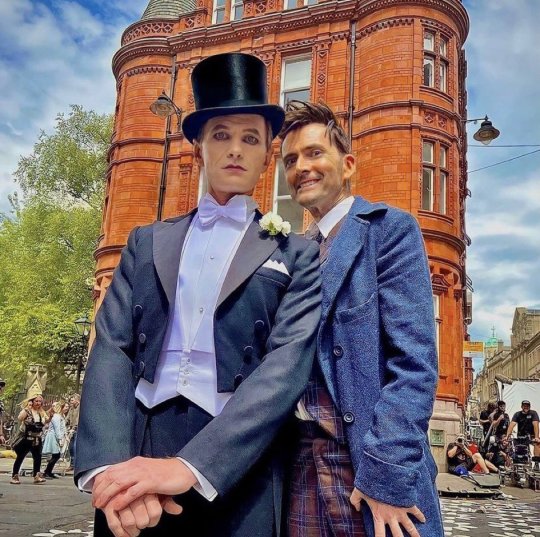
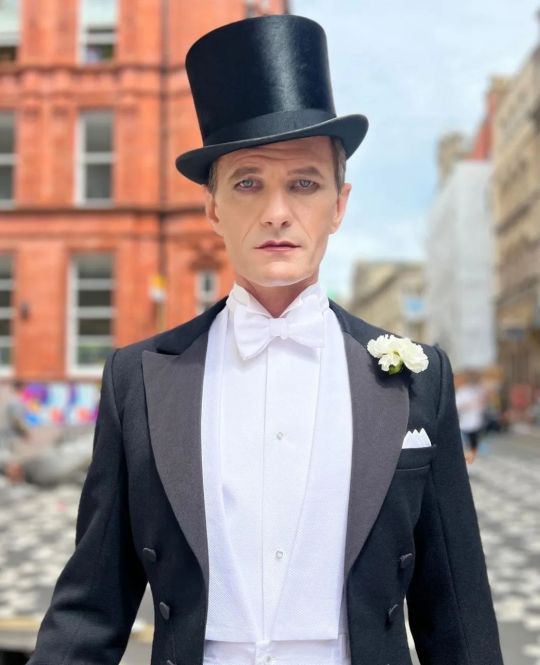
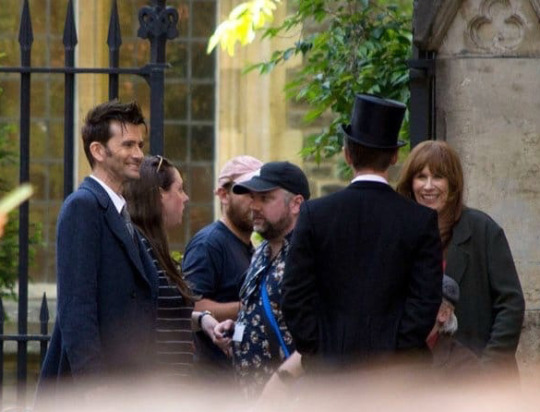
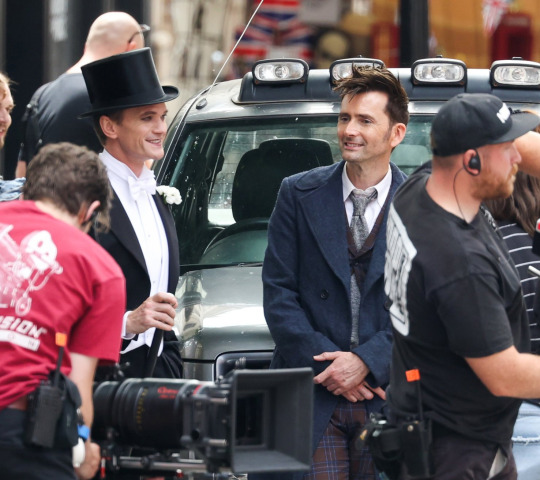
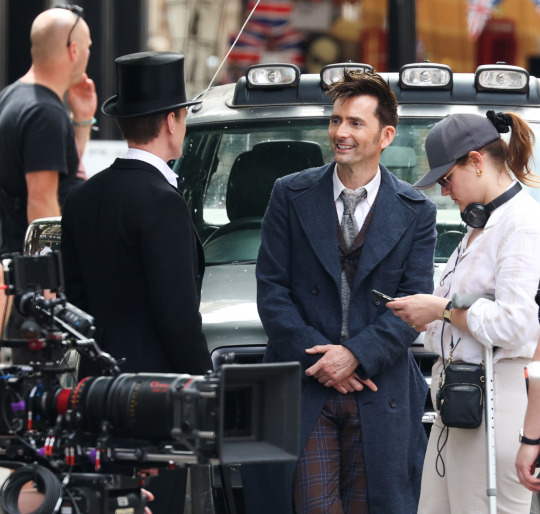
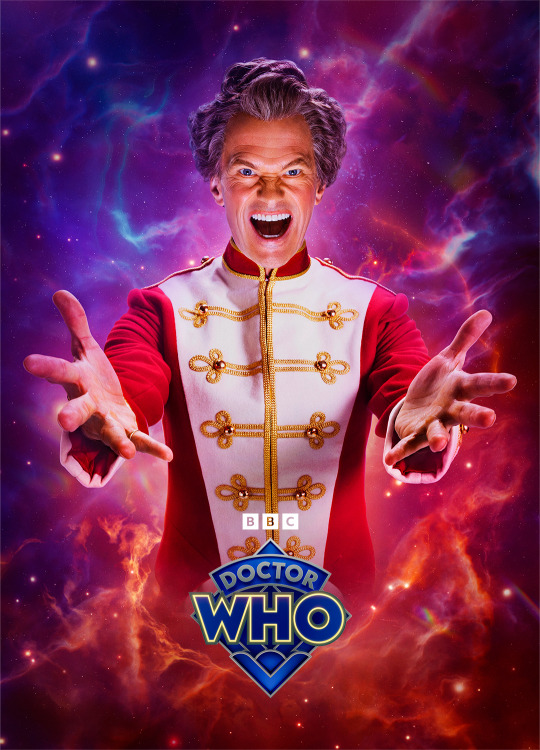
Behind the Scenes of The Giggle - Part Three
From Entertainment Weekly (Dec 2023 by Clark Collis):
Doctor Who showrunner Russell T Davies tells EW that the American actor was completely unfamiliar with the beloved science fiction series when the executive producer approached Harris about playing a villain called The Toymaker on this Saturday's final 60th anniversary special episode, "The Giggle."
"He’d never heard of it in his life, bless him," Davies says with a laugh. "I was lucky enough to work with the great man on a show called It’s a Sin, about the AIDS crisis in the 1980s, and working with him was such a joy. The Toymaker, he's kind of the god of games, so he shuffles cards, he does magic tricks, and all of that fits Neil Patrick Harris. If you go through agents, they often tell you to go away. I was able to send just a text saying, 'Do you fancy reading this?' He read it and literally phoned me up going, 'Let me get this right, so the Doctor’s an alien, right?' I was like, 'Oh my god, you really have never heard of Doctor Who!' But he couldn’t resist it, and he came to Cardiff, and we had the most spectacular time."
Davies explains that, "it's very hard to find the villain who can match David Tennant and Catherine Tate. To have a character who can be in danger of defeating those two is very hard to find. Sometimes on Doctor Who, you need armies of a thousand robots who could do that. This is just one person, so casting them was absolutely crucial and this becomes a pivotal event in the Doctor’s life. We needed that man, and, god, we had a glorious time. It’s so lovely working with Neil. When I text him now, [we ask], what’s our third project together? We’ve got to keep going!"
With huge thanks to all who shared set photos (including @TomWrenPhoto on Twitter)
For other posts in this set, please see the #whoBtsGiggle tag. The full episode list is [ here ]
#david tennant#catherine tate#neil patrick harris#doctor who#rtdedit#the giggle#60th anniversary#dw 60th#he was indeed an excellent toymaker#I'm glad they all had fun together#oh what I would give for footage of them doing escape games together#stuff i posted#whoBts#whoBtsGiggle
321 notes
·
View notes
Text
hello goodreads pals, my transMad abolitionist antipsych novel, Failure to Comply, now officially has a goodreads page! you can also see the preliminary shop page here (not avail for preorder yet but i will update when it is ofc!).
Failure to Comply uses experimental/hybrid poetics + science fiction/horror strategies to explore medico-psychiatric monopolies on Truth & Reality itself, and the thinking-loving-sensing-caring practices through which we can event new worlds. consider adding it / sharing / telling friends, and contact me if you want an ARC for advance review/publicity!
also, you can explore my dedicated tag for the Vibes and Energies of the novel :3
1K notes
·
View notes
Note
Playstation Spidey is sooo blorbo- I love himmm. May I request something where Pete and Reader have been too preoccupied with studying and taking exams all week that when their date arrives on Saturday, they don't do anything but makeout instead cause they miss each other so much?🥲 (I just wish I had a Peter Parker to kiss😔)
I love him too and this idea is just 🤌🤌. I hope it's okay I made this a friends to lovers instead? :)

Your phone buzzes with a new message from Peter.
Peter: hey we still good for Saturday? the study date at the library?
Peter: sorry for not picking up earlier. Phys 403 is kicking my ass 🥹
You giggle to yourself. Peter had been so excited to see you this week- he was terribly busy with internships and FEAST and every single exam that was assigned this week.
You had half the workload he did, and you struggled to finish things, so you had no idea how he did it. It was quite irritating, not being able to catch up with Peter as often as you'd like, but you were hanging on for Saturday.
Even now- he strangely missed your calls and would usually pick up ASAP- and May's told you he's not at FEAST, so it's really confusing to you where he'd be. But you're not concerned, because you have exams to study for.
You: Yea we're still good pete
You: don't stress about it. worry about your exam
Peter: 🫡 will do ma'am
You laugh, picturing Peter saluting to himself.
/
The timer for your Shakespeare exam just rings as you hand it in to your professor, who gives you a firm, steely nod. You know how strict he is- he doesn't always allow for students to hand in things after the time's up, and even as you leave the classroom, you hear students pleading with him to let them hand in their exams.
You shrug to yourself, and turn the corner of one of the many hallways of Empire State University- bumping straight into Peter.
"Oh-!" You topple over, and although at your trajectory in the air you should've fallen over Peter, he somehow has enough strength to keep you upright in the air, holding you gently by the waist, and before you can think too much about his surprisingly strong capabilities, he's set you down again already.
"All good?" Peter asks, and you nod bashfully.
"Yeah. Just finished my Shakespeare exam. Not sure if I did all that well." You tell him, and Peter raises his eyebrows.
"With Strict Dr. Powell, huh?" Peter gives a wary glance past your shoulder, and then leans in extra close, seemingly not noticing how you fail to maintain eye contact. "Just between you and me, I'm pretty sure he's not actually tenured."
"What?" You stare up at him in surprise. "How else would he be qualified to teach a fourth year English course?"
"Well, let's just say I did a little sleuthing after getting a C- on my last essay. I know, I know what you're going to say-" Peter shushes you as you laugh, taunting him about an unusually low grade. "It was on Asimov, you know? Father of Science Fiction?"
"I think that was H.G. Wells, Pete."
"Right, whatever." But Peter's features bristle with that familiar fondness for you, and you smile softly at him as he continues. "I knew even if my essay wasn't perfect, a C- was really lowballing what it should've been. So I searched some of the school records, and he's actually named Powalski. ESU's letting him stay tenured even though he's only been a professor for five years. My guess is that they owe him some kind of favour."
"And that's why our poor student body has to worry about failing English classes this year, when they should be easy. Because of one crazy professor." You surmise, and Peter nods. "Still, I can't believe you went through the school records! How did you even access them?"
"Uhhhh..." Peter shrugs as he starts backing away, a slightly flustered look on his face. "Parker luck?"
"Peter, I thought that was supposed to mean bad luck." You retort, laughing over his antics.
"Yeah, I never said I wasn't in hot water for doing that." Peter jokes, and he flashes a peace sign at you. "I gotta head to my Physics exam. Talk to you later?"
Before you can respond, Peter suddenly squeezes your shoulder in a quick move, and he takes a moment, staring at your face, and your mouth, before dashing off. "I'm sure you did great on your exam, regardless!"
"Thanks." You're left with a sheepish smile that you shake off your face when Peter's far in the distance, unaware that he's got the same expression on his face.
/
Peter's kind of struggling a little bit with physics.
Sure, he's a total brainiac, and he's sure to ace it even with his current mood- he's just terribly distracted.
You smelt really good today. Like warm, vanilla-cinnamon goodness. Peter's heightened senses tell him you've got a new perfume.
But he's more focusing on your lips for some reason. Ugh, no. Peter knows why he focuses so much on your lips- you just happen to smile in the cutest, sweetest way.
And just now- you had laughed in the funniest way, your lips curling into a pout that Peter was sure was seared into his mind for good.
Oh, no. I'm a total goner. He gets back to his exam, ignoring this urge to kiss you.
/
There's a knock at your apartment door just as you're finishing tidying up. Your living room tends to be pretty ugly, and the last thing you want is for Peter to think you're a slob.
Peter calls your name through the door. "I'm not going to think you're anymore messy than I am. Stop cleaning! We gotta leave soon if we want to make it for our allotted study room time, and I just need to use the bathroom."
You shake your head, give yourself one last glance in the mirror, and then open the door.
"Finally. God, dude, you would think your apartment is a pigsty or something. I'm only going to be in here for five minutes." Peter jokes. "You would hate to see mine."
"Is that why you've never invited me there?"
"Uh, yeah. Otherwise you could crash whenever you wanted to there." Peter suddenly turns red. "I mean... you know, you're always tired after class and your apartment is further away from ESU than mine is."
"It's fine, Peter. No need for rambling." You reach forward, wanting to take the books out of his hands- you notice a slight scar on his palm. "Hey, what's that?"
"Ah, just an accident at Octavius' place. No big deal, it'll be gone before I know it." Peter randomly opens a door. "This the bathroom? No, it's a closet. Darn these misleading doors..."
"Down the hall, to the right, Peter."
He nods, and you suddenly feel a wave of giddy energy as he's gone. Yes, you've crushed on Peter for a while- you just don't think it's going to go anywhere since you're both so busy.
You're reapplying your lip balm when Peter wanders back to you a couple minutes later.
"Ah, should we go?" You say, slightly muffled as you continue reapplying. It's a delicious honeydew flavour- you can't help but eat your lip balm off your lips from time to time.
"Yeah..." Peter struggles to say something, anything, and you catch his eyes drifting from yours, to your lips.
"Is something wrong?" You look up at him uncertainly. "There wasn't enough toilet paper, was there?"
"Shoot. Might've used the last bit, sorry." Peter jokes, but he turns quiet, and he grows a little pink.
"Well, if that's all, let's get going." You put your lip balm back in your pocket, and move to get your coat out of the closet, but Peter grabs your arm with that too-quick motion he always seems to possess.
Peter wordlessly cradles your face- there's something echoing through his expression right now, affection, the kind, softness you've always known him to possess, but something else, too. Yearning.
You can't help but smile up slightly confused at him, not sure of his intentions, and while you're not stupid, you're not going to assume anything.
Peter doesn't hesitate and simply leans in and kisses you, a soft kiss that turns a lot more firm as you're pulled inwards by his hands, and you eagerly kiss him back, and you feel him grinning widely when he knows that you've wanted this as much as he had.
It's easy, it's always fun when it's with you, and he figures you both need stress relief anyways. Rather than studying chemistry in the library.
You reach upwards, and run your fingers through his brown, soft hair, and Peter groans ever so slightly against your mouth, which pleases you.
Suddenly he lets go, deeply red and looking a little woozy, but he still holds you close. "Sorry, I- I got a little carried away there."
"Don't be sorry. I wanted to do that too." You admit, a little shyly. "Are you okay with not studying?"
"Really? That's what's on your mind?" Peter looks genuinely a little aghast, even if he is joking. "I must've not kissed you hard enough."
Peter brings you to your couch, where you kiss him again, taking the lead in a way that makes his stomach flip-flop, not dissimilar to the way he feels when he free-falls off a building. You clamber onto his lap, trying to be gentle- and he pulls you down fully on him, wanting to feel every inch, every millimeter, even, against his body. There's an excited thump in his body for every squeeze he makes against you, and he feels his restraint leaving him when you suddenly sweep your tongue into his mouth.
Even when you leave room for air, Peter is insistent, reaching forward with more little kisses all over your cheek, and you reach back again for him, pressing your lips against his, feeling like there's no need to ruin this time with talking.
He really likes that. These are precious moments, few to be found considering how busy you both are, and Peter intends to make the most of it.
#peter parker x reader#ps4 peter parker x reader#ps4 peter parker#ps5 peter parker x reader#ps4 spiderman#ps4 spider-man x reader#ps4 spiderman x reader#ps5 spider-man x reader#ps5 spiderman x reader#ps5 spiderman#ps5 peter parker#peter parker x you#peter parker reader insert#peter parker fluff#peter parker fanfiction#spiderman x reader#spider-man x reader#insomniac spider-man#insomniac spider man#insomniac spider-man x reader#insomniac peter parker
562 notes
·
View notes
Text
Really tired of streaming services making absolute banger animated TV shows for adults, never advertising them, then canceling then because no one watches them, so I'm taking it upon myself to share some of the ones I've watched recently with the hope other people will hear about them for the first time and give them a shot.
---
Blue Eye Samurai

"A master of the sword lives life in disguise while seeking revenge in Edo-period Japan."
Probably one of my favorite animated shows of all time. Mizu, arguably one of the best sword masters in this time period, goes on a quest to eliminate four white men living in Japan, one of which is Mizu's father. The show focuses heavily on how factors outside of your control, such as race and gender, impact how others view you and how you view yourself.
Watch if you are a fan of: Complicated characters/relationships, revenge quests, gore, complicated relationships with gender and race, and absolute badass characters.
Where to Watch: Netflix
Undone

"After 28-year-old Alma nearly dies in a car accident, she finds that she has a new relationship with time; she develops this newfound relationship to find out the truth about her father's death."
Undone focuses on difficult relationships with family, including how your parents can have profound effects on you even after they're gone, and how to deal with grief. That, plus the added chaos of being able to travel through time.
Watch if you are a fan of: character studies, shows dealing with grief, time travel, trying to rewrite fate.
Where to watch: Prime
Scavengers Reign
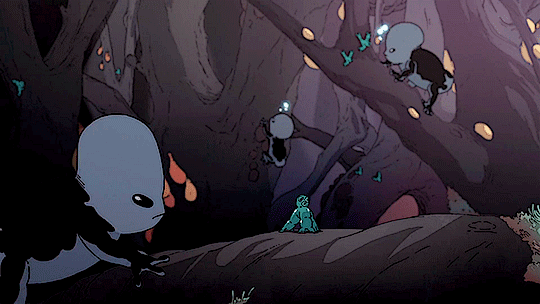
"The crew of a damaged deep space freighter are stranded on a beautiful but dangerous planet."
A mix between sci-fi and horror, this show focuses on the crew of a crashed spaceship. Each (living) crew member of the ship escaped in pods, scattering them across the planet. They must fight to survive and make their way back to their ship on a planet featuring some of the most fucked up creatures I've ever seen.
Watch if you like: sci-fi, isolationist horror, body horror, creature features
Where to watch: At the moment, Max. As of May 31st, Netflix. Max canceled the show (even though it has a 100% rating 🙃). Netflix may make a season 2 depending on how many people watch it in the first few weeks after it comes to Netflix.
Harley Quinn
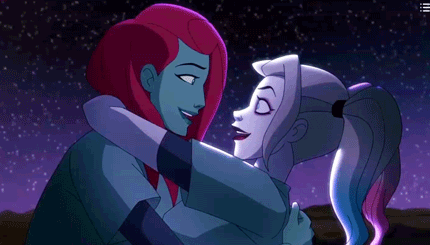
"The newly single Harley Quinn sets off to make it on her own as the criminal queenpin in Gotham City."
Honestly I was feeling a bit burnt out on super hero shows, but this one felt like a breath of fresh air. It follows Harley as steps out from the shadow of the Joker, no longer being one of his henchmen and struggling to find her identity as a single, independent villain.
Watch if you like: Superhero/villain shows, stories that focus on blurred lines instead of a clear distinction between good and evil.
Where to Watch: Max
Primal

"At the dawn of evolution, a caveman and a dinosaur on the brink of extinction bond over unfortunate tragedies and become each other's only hope of survival in a treacherous world."
This show is super unique in that there's basically no dialogue, but it still finds a way to display an absolutely gutwrenching relationship between two parents of different species going through shared grief.
Watch if you like: Brutality, heavily visual story telling, prehistoric stories, and tales of overcoming.
Where to Watch: Hulu
Love Death and Robots
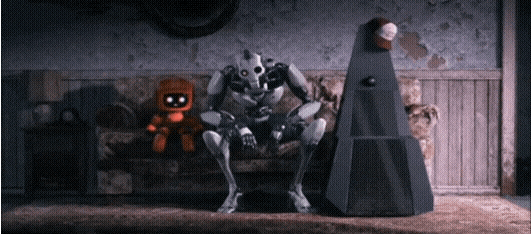
"This collection of animated short stories spans several genres, including science fiction, fantasy, horror and comedy. World-class animation creators bring captivating stories to life in the form of a unique and visceral viewing experience. The animated anthology series includes tales that explore alternate histories, life for robots in a post-apocalyptic city and a plot for world domination by super-intelligent yogurt."
I love this show because you never have any clue what to expect. A siren living in a river falling for a deaf knight? An artist painting intergalactic art pieces? Three robots going on a field trip through the apocalypse to visit old human historical sites? You never know, but there's going to be love, death, and/or robots in it. Each episode varies wildly, so I'd recommend watching at least a few to get a taste for it, as some will resonate more strongly than others.
---
I'm sure there are lots more excellent animated shows, but these are all the ones I've watched in the past year or so. I'd love to see more recs in the tags, because I'm always down to watch more cool animations!
#i just want these shows to get the attention they deserve#animation#tv#personal#the life of an audio engineer#tv recs
233 notes
·
View notes